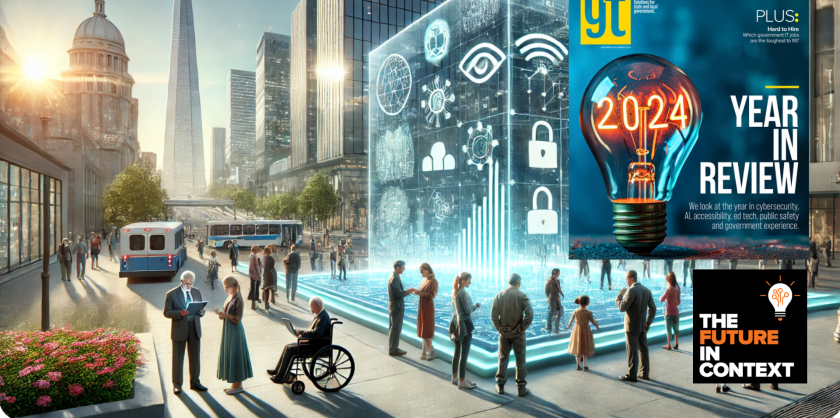The Future in Context
In a pivotal year, governments enacted AI laws, strengthened defenses, bridged the broadband gap, and prioritized accessible, user-friendly digital services. As 2025 nears, most jurisdictions still lack fully mature AI frameworks.
Future in Context
David French’s new book, "Divided We Fall," is a warning of what might happen to America as it becomes less united than at any time since the Civil War. But there are concrete steps the country can take to bridge the gulf.
President Trump’s illness from the coronavirus has become immediate news, with the entire country pondering what might happen. But previous presidents who became ill were able to keep their health problems under wraps.
With concerns growing that this year’s election may end up in the hands of the Supreme Court or the House of Representatives, history shows this happened once before in the "dangerous election" of 1800.
Presidential appointments to the highest level of the judicial branch, even during lame-duck sessions, have a long history in American politics, dating back to Thomas Jefferson and John Adams in 1800.
Great nations have shared values, shared aspirations and a shared historical narrative. That does not mean everyone agrees, but there has to be at least a baseline understanding of our national purpose that we can agree on.
Most Americans would prefer not to mix sports and politics. But when NBA players protested by canceling playoff games, they brought the issue of race relations to the forefront better than any politician or protest group.
If we are genuinely searching for national healing and reconciliation, look at the aftermath of the election of 1800, which was as angry and mean-spirited as any in our history.
It is deeply imbedded into the idea of what we expect from our national government. Able to reliably deliver letters, prescriptions and ballots anywhere in the country, the Post Office has become more important than ever.
Trump is not the first president to portray his opponent as anti-religion or of the wrong faith. The tradition goes back to the beginning of the republic. But the controversy has gained momentum recently.
During the pandemic, a vehicle breakdown in the middle of Montana becomes a teaching moment on how a good Samaritan is seldom a person of one’s own stamp, which is the point of Luke 10: 25-37.
Who was the man who sculpted the controversial statue of Theodore Roosevelt in front of the Museum of Natural History? He was no racist, but the messages of his famous figures have become problematic.
Of all the ways the 21st century might wish to memorialize Roosevelt, that statue was the least representative of the whole man, his staggering achievement and his largely untarnished place in American memory.
Thomas Jefferson was not the first choice to write the Declaration of Independence. He accepted the assignment reluctantly, but he brought genius to the project, including the 35 most important words in the English language.
The act of breathing, which we take for granted, has become the focal point in how we deal with racism, the COVID-19 pandemic and the air our modern society pollutes, killing millions every year.
Many of America’s founders were slaveholders yet wrote eloquently about the rights of man. To understand Jefferson, Washington and the rest, we need to see them for what they are, not for what we wish they had been.
In his review of Lindsay Chervinsky’s ‘The Cabinet,’ Editor-at-Large Clay Jenkinson finds a well-researched, thoughtful and fascinating book that points to the strength and the weakness of the U.S. Constitution.
History provides us with numerous examples of how knowledge and, most importantly, leadership either withstood the strain of a crisis, or unraveled. We are in one of those periods right now.
A rally at the steps of the state capitol in Bismarck presents an important moment to revisit the unique federalist form of our republic that Thomas Jefferson and the founding fathers created more than 200 years ago.
The author’s masterpiece, The Plague, will make you think, ask all sorts of Socratic questions of yourself and form resolutions about how you intend to measure your life after getting through this global catastrophe.
The nation has enjoyed public health triumphs, with life expectancy far higher than it was a century ago. But responsibility for health has always been scattered, with disease tracking less a priority than treating individuals.
As the world eagerly awaits a vaccine for the coronavirus, 200 years ago a smallpox cure struggled to gain acceptance. This is how our founding fathers helped promote the medical breakthrough that saved countless lives.
Two centuries ago, John Adams and Thomas Jefferson had to wait months, sometimes years, for a new book to arrive from Europe. Today, technology has removed boundaries to knowledge that would amaze our founding fathers.
We’re at the height of this epidemic, so the collapse of the Mandan Indian Nation in North Dakota in the late 18th and early 19th centuries from outbreaks of smallpox is a reminder of how ignorance can be so deadly.
As governors take leading positions on how to manage the pandemic, the nearly forgotten cornerstone of the Constitution is relevant again. It’s a reminder of how federalism and our form of government works.
Throughout the ages, writers and historians who have witnessed pandemics have chronicled their impact and provided us with a valuable history lesson on how not to repeat the mistakes of the past.
The removal of Captain Brett E. Cozier of the aircraft carrier U.S.S. Theodore Roosevelt for his handling of the coronavirus evokes the sometimes-controversial career of Colonel Theodore Roosevelt.
Jefferson's experience with the yellow fever epidemic of 1793 reinforced his dislike of cities and shaped a radical plan for the development of a new nation that even included his concept of urban design.
In uncertain times, we search for assurances. The humanities, including stories about coping with past plagues, provide a powerful reference to how things can be made right again.
About This Podcast
Most Read































